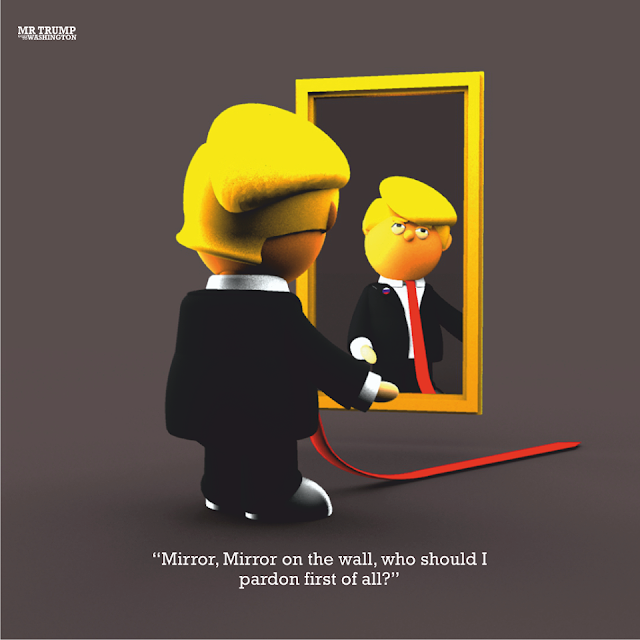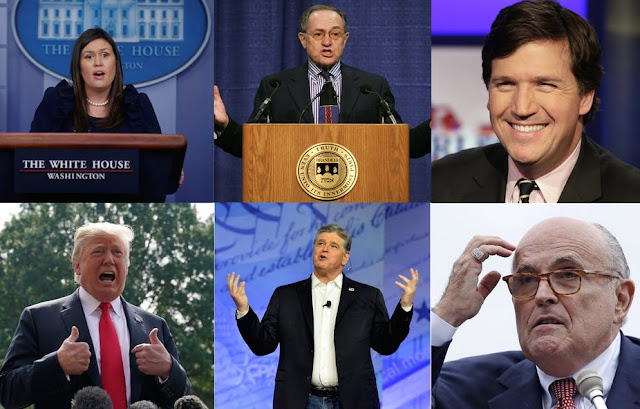The statements of Cohen, Trump’s longtime personal attorney, seemed damaging.
Cohen pleaded guilty to federal charges of campaign finance violations and swore, under oath, that he acted to prevent “information that would be harmful to the candidate and to the campaign” from reaching the public for the “principal purpose of influencing the election.” In confessing to the federal crimes Cohen also implicated his client, Trump, by saying he committed these crimes at the behest of “a candidate for federal office.”
As a New York Times analysis put it, Cohen’s statement in court “carried echoes of President Richard M. Nixon, who was named an ‘unindicted co-conspirator’ in the special prosecutor’s investigation of Watergate.”
Because of the seriousness of Cohen’s plea, the question wasn’t if Trump and his surrogates would respond, but when.
Trump and his team reportedly “spent hours working on a statement” to attempt to clear Trump’s name and reject the “unindicted co-conspirator” label. By the following morning, a messaging strategy seemed to coalesce.When someone attacks me, I always attack back...except 100x more. This has nothing to do with a tirade but rather, a way of life!— Donald J. Trump (@realDonaldTrump) November 11, 2012
As a professor of rhetoric and argumentation who is finishing a book about Trump’s presidential campaign, I paid close attention to what Trump’s camp decided to say in his defense.
“Apologia” – an Ancient Greek term for the speech of self-defense – can assume a few well-known forms. They include: denial (“I didn’t do it”), differentiation (“It wasn’t what you think, it was something else”), bolstering (“Important people approve of what I did, so you should, too”) and transcendence (“Let’s focus on what is really important here – the big picture”).
Trump’s apologia has been primarily based upon denial and differentiation. He wants to persuade Americans that he did nothing wrong and that things are not what they appear to be.
To buttress this, his defenders relied upon what rhetoric scholars call “points of stasis,” which are questions that debaters since Aristotle have used to develop their most persuasive appeals.
Points of stasis deal with four questions: What happened? How should we understand it? How should we value it? What should we do about it?
In coming up with answers to these questions, debaters will attempt to frame what happened, influence how we should understand it, dictate how we should value it and outline what should be done about it.
When paired with apologia, points of stasis can be used to try to wiggle out of difficult situations. They can help an audience understand new information from the perspective of your side and mitigate damaging charges.
For example, Trump’s lawyer, Rudy Giuliani, attempted to explain what happened when he released a statement denying that Trump was implicated at all in the Cohen matter. “There is no allegation of any wrongdoing against the President in the government’s charges against Mr. Cohen,” it read, framing the events in a way that vindicated Trump from any wrongdoing.
But, you might wonder, if Trump wasn’t specifically implicated in Cohen’s guilty plea, then how should we understand what happened? Didn’t hush money still get paid to help the campaign?
To shape how observers might make sense of this, lawyer Alan Dershowitz, the author of the book “The Case Against Impeaching Trump,” appeared on CNN, “Tucker Carlson Tonight” and “Fox and Friends” to argue that everyone commits campaign finance violations – and that campaign finance rules are incomprehensible anyway.
In other words, viewers should realize that this is something really common in politics – an easy mistake to make that shouldn’t be thought of as a big deal.
According to Dershowitz, campaign finance violations are trivial infractions like jaywalking. And if hush money were paid, while it’s not exactly noble behavior, it isn’t a crime. Little value, he seems to be saying, should attributed to the crimes – if they were committed at all.
Furthermore, there’s not much that can even be done about it, they say. A sitting president cannot be indicted (and therefore audiences and courts do not get to judge). And even if it were crime, it isn’t a “high crime,” so it isn’t an impeachable offense.
⏩ To recap the points of stasis:
- What happened? There’s no allegation of wrongdoing by the president in the government’s charges.
- How should we understand Cohen’s guilty plea? It’s a mere campaign finance violation, which everyone commits.
- What sort of stock should we put into this crime? It’s like jaywalking.
- What if Trump paid hush money? Not great, but not illegal.
- What can be done about it? Nothing. The president can’t be indicted.
Of course, this isn’t playing out in a courtroom or in the Athenian Agora. Instead, it’s playing out in the court of public opinion. Impeachment is a political process, and it seems to hinge on whether enough voters get fully behind the effort..@Scaramucci: "What's clear is that you can't indict a sitting president." #TheStory pic.twitter.com/4lkGDEN7IL— Fox News (@FoxNews) August 21, 2018
In this sense, one bolstering strategy may resound the most. Trump’s base is so firmly in his camp, some of his backers in the media have argued, that this news won’t hurt Trump’s political standing.
It doesn’t really matter if he is an unindicted co-conspirator, they say – because his supporters won’t care.
Trump may have enough support for now to stay afloat. How long he can tread water is unclear.About Today's Contributor:
Jennifer Mercieca, Associate Professor of Communication, Texas A&M University
This article was originally published on The Conversation.
Bonus Picture:
 |
| Will Donald Trump need to pardon himself after all? (Image from Trumpton Facebook Page via LoupDargent.info) |
More Donald Trump Related Stories:




















